


 Richard Rose: Spiritual Teacher Who Changed Lives
Richard Rose: Spiritual Teacher Who Changed Lives
by Paul Constant
In this essay, we'll recommend spiritual writers and spiritual teachers and take an in-depth look at Richard Rose and his teachings.
![]()
It was a time, though brief, that would exponentially intensify the spiritual evolution of those who would listen.
In the years near the latest turn of the century, a revolution transpired among some of the greatest thinkers this world has known. It was an era when the wheels of change were rapidly turning in many places of the globe, even more so than traditionally. It was a time, though brief, that would exponentially intensify the spiritual evolution of those who would listen.
A profound yet relatively unrecognized pioneer of the late eighteenth century was one by the name of Phineas P. Quimby. While America was in the throes of civil war, Dr. Quimby was diligently at work laying down the foundation of his Science that would later expand into Christian Science through Mary Baker Eddy's efforts. Quimby was by no means a conventional medical practitioner, and in fact denounced "modern" medicine of the day as a lofty paradigm that inflicted its ills upon the public. Instead of employing conventional means, he initiated direct mental (intuitive) contact with his patients, often immediately healing both acute and chronic illnesses and effecting permanent cures for patients considered incurable by other doctors. In fact, Quimby healed so many patients in a seven-year period that even the medical field of his time could no longer deny his authenticity—despite his unconventional cures. Phineas Quimby stands alone as an intuitive giant of the 1800's who perfected the skills of the Scientific Man and his direct-mind ability to heal.
But others were not far behind in the world of mental giants. While Quimby was
busy formulating his methods, another clairvoyant was establishing new inroads
into Asia and Europe and conversing with numerous Tibetan and
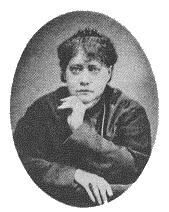 Hindu sages as well as other "masters" of her time. In 1875, Helena Petrovna
Blavatsky would go on to establish the foundations of the now well-known
Theosophical Society, and subsequently set to writing masterful summaries of her
findings in titles such as Isis Unveiled and The Secret Doctrine.
Blavatsky's literary accomplishments were staggering—5,000 pages in book
form and over 1,000 articles for various publications, not to mention an astounding
number of personal transactions with anyone who inquired about her discoveries.
In addition to her writings, H.P. Blavatsky was her generation's greatest clairvoyant
as well, but remains best known by her works that have helped thousands of truth
seekers over the past hundred years.
Hindu sages as well as other "masters" of her time. In 1875, Helena Petrovna
Blavatsky would go on to establish the foundations of the now well-known
Theosophical Society, and subsequently set to writing masterful summaries of her
findings in titles such as Isis Unveiled and The Secret Doctrine.
Blavatsky's literary accomplishments were staggering—5,000 pages in book
form and over 1,000 articles for various publications, not to mention an astounding
number of personal transactions with anyone who inquired about her discoveries.
In addition to her writings, H.P. Blavatsky was her generation's greatest clairvoyant
as well, but remains best known by her works that have helped thousands of truth
seekers over the past hundred years.
Franz Hartmann, M.D., himself a late 1800's Theosophist, was another literary genius who diligently explored man's inner psychology and who lucidly wrought forth detailed discoveries. Hartmann, like Quimby, maintained that direct-mind perception was a sixth sense and that it could be naturally developed in some and through effort in others. He expanded tremendously on the fundamental laws of Nature and wrote of ways by which individuals could develop the power to perceive truth on their own, independent of anyone's opinion.
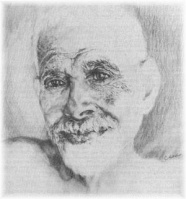
The late 1800's and early 1900's would spawn other great teachers who would add to the integrity of humanity's spiritual and philosophical direction. Ramana Maharshi, whose teachings were brought to the West by author Dr. Paul Brunton, was well known for his elucidating explanations of various mental capacities and mystical experiences—a feat not easily accomplished by any stretch of the imagination. His teachings were based on an Enlightenment experience in 1896, at the age of only 17 years. Another master at conveying Eastern knowledge in the thoughtforms of the West was born in 1866. Unlike Maharshi, however, George Ivanovitch Gurdjieff was superbly adept at bridging the gap between Eastern philosophy and Western science, all the while claiming no religion and stressing that his ideas originated from an ancient science transmitted in esoteric schools. One of his students, P.D. Ouspensky, meticulously outlined Gurdjieff's ideas in some of his own books, showing Gurdjieff as highly controversial and often upsetting to those he contacted. Yet Gurdjieff and his "Fourth Way System," as he called it, stands alone as one of the most insightful systems into human psychology that Westerners have ever known.
J. Krishnamurti would fuel the turn-of-the-century fire in 1931, when he struck out to "set men absolutely, unconditionally free." Building on his mystical experience in 1922, Krishnamurti became an authority by the overwhelming sincerity and force of his teachings, though he rejected all claims to authority by lineage or otherwise. Without question, he was one of the more adept speakers in the 1900's, transforming esoteric ideas into the layman's language and encouraging listeners to dispel their entrenched thinking patterns.
Seemingly, the spiritual hiatus of the late 1800's and early 1900's fell into steep decline during the thirties, forties and fifties. Through the decades, Americans witnessed economic hardship, world war, and finally economic prosperity. Enter the explosive 1960's, when America's societal foundations were rocked to the ground, sending previously unquestioned values reeling, and whipping the Zeitgeist of the seventies into action. Fundamental religious values came under fire, opening a wide door to innumerable cults and counter-religions to which the youth pledged allegiance with open arms and oft-times tear-filled eyes. Catalyzed in part by the prolific use of lysergic acid diethylalamide—L.S.D. or "acid" in short—young individuals everywhere began throwing old values out shattered windows and endorsing new ones that appealed to the "free thinkers." What failed to materialize at the time, although apparent in later years, was that the freshly sprung cults and esoteric groups contained no more integrity than their fundamentalist predecessors. In fact, so many so-called "gurus" (the term "teacher" was not fashionable) ate from the alters, fattened their wallets, and satiated other unmentionable appetites that even today the integrity of most spiritual movements is under question. While many doubt the value of the much-maligned seventies' religious rebellion, America's conscience was raised to the possibility that alternative pathways existed for segments of truth seekers who were no longer satisfied with more conventional means of spiritual growth.
![]()
Amidst the clamor of the seventies' re-evaluation, when charlatans ran aplenty
and with Truth hidden below mountains of chicanery, one man called to those who
would listen, to those with enough intuition to realize perhaps that words must
be proven and not accepted with unquestioning belief. Early in 1972, this
unobtrusive man sputtered along in his well-used van, traveling from his
hometown near Wheeling, West Virginia to present an alternative viewpoint at a
meeting in Pittsburgh, Pennsylvania. While other authors and lecturers were selfishly
 expounding the merits of their own spiritual system, Richard Rose,
fed up with the hypocrisy, sought to tear down the veil of nonsense that surrounded
the modern-day charlatans. He began his lecture by throwing stones at glass
houses—fundamental religion, the then-faddish cults, the paradigm of psychology,
and "authority" in general—but seemingly subscribed to none of the popular or
even unpopular camps. He was an amateur speaker, of course, and in general his
viewpoints and discoveries met with raised eyebrows, especially those individuals
entrenched in their own systems of thinking. However, several college students,
seeing the depth of Rose's insight and the sincerity in his message, sought to further
his discoveries in the universities which they were attending. From that day, many of
his listeners had a long way to go to catch up with the incisive mind of Richard Rose,
but nonetheless they were inspired to consider philosophical possibilities that were not
readily apparent in their structured world.
expounding the merits of their own spiritual system, Richard Rose,
fed up with the hypocrisy, sought to tear down the veil of nonsense that surrounded
the modern-day charlatans. He began his lecture by throwing stones at glass
houses—fundamental religion, the then-faddish cults, the paradigm of psychology,
and "authority" in general—but seemingly subscribed to none of the popular or
even unpopular camps. He was an amateur speaker, of course, and in general his
viewpoints and discoveries met with raised eyebrows, especially those individuals
entrenched in their own systems of thinking. However, several college students,
seeing the depth of Rose's insight and the sincerity in his message, sought to further
his discoveries in the universities which they were attending. From that day, many of
his listeners had a long way to go to catch up with the incisive mind of Richard Rose,
but nonetheless they were inspired to consider philosophical possibilities that were not
readily apparent in their structured world.
In those days, it was customary for lecturers to methodically destroy, possibly through harsh criticism, most commonly accepted belief systems and then substitute alternative propaganda and paradigms as the only "true" pathway. Rose stood alone in his call for a return to an honest critique and evaluation of all spiritual systems, whether new or old. He often discussed unprecedented formulas for expediting truth seeking and always qualified his statements with remarks that encouraged deep thought rather than belief in his ideas. His controversial discussions on morality, which diametrically opposed the Crowley-like "do as thou wilt" trend of the seventies, often angered listeners; yet, he never spoke of activating a neo-Puritan movement, but instead elaborated on the genetically encoded morality programmed by nature.
Seeing that some individuals who came to his early lectures were interested in
serious philosophical study, Rose and several others decided that central ideas
could be expanded more efficiently through the formation of a non-profit group.
Although many, including Rose, were reluctant to solidify into an entitled
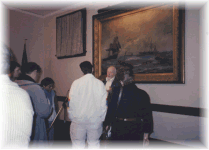 entity—disdaining dogmatism and the like—they decided a more cohesive
group would enable the furthering of ideas at nearby universities. On that day in April
1972, the group adopted the name "TAT," which stood for Truth and Transmission.
It was a decision that would later foster a gathering place for seekers from all walks of
life, and allow a rare exchange of ideas that otherwise would not have occurred.
entity—disdaining dogmatism and the like—they decided a more cohesive
group would enable the furthering of ideas at nearby universities. On that day in April
1972, the group adopted the name "TAT," which stood for Truth and Transmission.
It was a decision that would later foster a gathering place for seekers from all walks of
life, and allow a rare exchange of ideas that otherwise would not have occurred.
By no means did Rose suddenly decide to begin delving into spiritual matters in the early 1970's. On the contrary, the Zeitgeist of the seventies opened a door he had sought for some thirty-odd years. Rose's lifelong quest can be traced back to 1929, when he was twelve years of age, although at the time he foresaw no long arduous searches in his life. He found himself testing the waters of religion at a seminary—the Capuchin Monastery in Butler, Pennsylvania—but after five years realized the priest-craft knew little more about God than he himself. Over the next thirteen years, he struggled through various phases of his life, searching by any means possible: first spiritualism, then science, and finally through dozens of cults and systems that professed answers to the meaning of life but which mostly offered hollow words. It was only in 1947 at the age of thirty, after an intense struggle to find an answer, did Rose finally experience a cataclysmic realization that forever changed his life. At this point, no words would adequately describe his experience of entering the Absolute, as he calls it, but for Rose it was an unanticipated Answer that destroyed all questions. It was traumatic, transcendental, final. Because of the time period in America, few individuals had the "ears" to listen to deep spiritual meaning, and so it was with great reluctance that Richard Rose re-entered the mainstream of life, sharing the details of his experience with only a few close acquaintances.
In subsequent years, Rose did not completely retire from his philosophical interests, but steadfastly intuited and expanded several formulas and discoveries that even today are unmatched in literary works on esoteric systems. In his initial work, The Albigen Papers, he exhorted seekers to "retreat from error" instead of entering a preconceived dream world about expanded consciousness. He did not build complex concept structures that promise, by following a set of chronological steps, the proverbial pot of gold at the end of the rainbow. In writing the book, he knew full well that each reader would have unique states of mind that hinder meaningful self knowledge, and he chose to catalyze the reader into action away from self delusion. In effect, his advice to retreat from such erroneous mind-sets erode "untruth" and leave an individual with a more pure fact state.
One of Rose's ideas expanded tremendously on Dr. Quimby's practice of direct mental perception. Writing in detail in his two books, The Direct-Mind Experience and Energy Transmutation, Between-ness and Transmission, he told of methods that can effect change almost without limitation. Labeling it "Between-ness" for lack of a better word, Rose wrote of a technique of changing material events just by holding the mental head on dead center. He wrote, "In the face of Reality or from the viewpoint of Absolute Reality, our efforts to affect the nightmare are comic and pathetic except for one effort—a better understanding of the possibility of Between-ness. This effort sees for man the possibility of surmounting the world of Illusion—consciously, not just in a trance—where things may just be another form of illusion." The "concept" of the world as illusion may have its roots in Eastern philosophies, but if you think the illusion cannot be altered, read of the theories on quantum mechanics. While most quantum physicists would not hasten to draw parallels between their work and Eastern sages, neither group would deny the fact that the substance of our observations is not what it appears. Rose's theory of Between-ness, which is only part of the Direct-Mind Science, goes one step further and says humanity's structured paradigms have sharply curtailed our ability to achieve anything, unless of course, one allows occurrences through Between-ness.
Rose's expansion of searching for a valid point of reference is another major
contribution to the world of truth seeking. In layman's terms, he often conveyed
the true essence of self-observation by demonstrating that the view (the world
of illusion, including thought) and the viewer (the Observing Self) are
distinguishable only by virtue of the observation point. In fact, Rose
constructed a symbolic
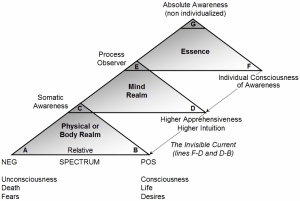 "Jacob's Ladder" that mirrors the deeper workings of
the mind, first showing man's nearly helpless situation of a dual somatic mentality,
and second, the mind's improving vantage point that comes with increasing
efforts of self observation. Finally, Jacob's Ladder culminates in an Absolute
Awareness—in his words, an "experience of transcending the mind [and
becoming] infinitely more aware than ever before." In Psychology of
the Observer, which describes Jacob's Ladder in detail, Rose
presents an entire formula on discovering and improving higher intuition, and
often repeats the need for developing intuition in his lectures and writings. The
developed intuition is put forth as one of the more valid points of reference, while
Absolute Awareness, possibly realized through Rose's formula, would be the ultimate
reference point and goal of most serious seekers.
"Jacob's Ladder" that mirrors the deeper workings of
the mind, first showing man's nearly helpless situation of a dual somatic mentality,
and second, the mind's improving vantage point that comes with increasing
efforts of self observation. Finally, Jacob's Ladder culminates in an Absolute
Awareness—in his words, an "experience of transcending the mind [and
becoming] infinitely more aware than ever before." In Psychology of
the Observer, which describes Jacob's Ladder in detail, Rose
presents an entire formula on discovering and improving higher intuition, and
often repeats the need for developing intuition in his lectures and writings. The
developed intuition is put forth as one of the more valid points of reference, while
Absolute Awareness, possibly realized through Rose's formula, would be the ultimate
reference point and goal of most serious seekers.
He wrote in Psychology of the Observer:
The Observer proudly watches the mind from and with the mind and gets nowhere until an accident occurs, and the individual conceives new variables to be considered as to the cause and nature of the mind itself.
This new observance of the mind with the mind, and with what might seem to be infinite variables for factors and explanations, leads to a resounding disaster for the mind which we failed to fully recognize when we were going through the processes of mental observation.
Of course, it is necessary to note here, that the disaster which the mind encounters is the threshold of man's final form of existence—his final illumination...from which he looks back and correctly defines all that he previously experienced.
While Richard Rose continued to write and lecture on these and many other ideas, his efforts and those associated with him began attracting a number of students of philosophy to his farm in West Virginia. Rose encouraged these gatherings because group effort, whether mundane or esoteric, could help expedite the processes of progress. In this case, progress was measured in terms of a seeker's more skillful ability to uncover untruths or half-truths in their own thinking processes and in everyday life. These meetings sometimes resulted in spontaneous discoveries that even surprised Rose. In one instance, he observed a dark wedge on the forehead of a woman in the room who, when asked if she had a headache, replied by describing its severe pain. Without hesitation, Rose walked over to her, cupped his hand overtop her head, and with a jerk "removed" the headache, immediately eliciting a favorable reply from the woman that her headache was gone. Rose, not wanting to engage in egotistical healing derbies, acted on the hunch that his motions would result in cure, and only by the woman's corroborating response did he know he was successful.
Other phenomena that surrounded Rose during his childhood, through adolescence,
and subsequent to his experience reflect the intuitive depth and stature of the
man. He saw death in seemingly healthy individuals days or weeks before it
occurred. He would often observe illnesses hitherto unknown to
 a person but later confirmed through medical diagnosis. He witnessed
materializations, healed the sick, predicted synchronistic occurrences, and
sometimes clearly and unequivocally perceived the thoughts and states of mind of
others he knows. Paradoxically, he did not focus much time on such endeavors,
and often discouraged others from engaging in a lifelong pursuit of phenomena or
miracles because they lead to tangents away from the true goal, which is
self-knowledge culminating in an Enlightenment experience. He wrote, "It is
pardonable to exercise this power a few times to encourage others to spiritual
actions, but it should not be encouraged, because of the use of mental energy
for poor physical causes."
a person but later confirmed through medical diagnosis. He witnessed
materializations, healed the sick, predicted synchronistic occurrences, and
sometimes clearly and unequivocally perceived the thoughts and states of mind of
others he knows. Paradoxically, he did not focus much time on such endeavors,
and often discouraged others from engaging in a lifelong pursuit of phenomena or
miracles because they lead to tangents away from the true goal, which is
self-knowledge culminating in an Enlightenment experience. He wrote, "It is
pardonable to exercise this power a few times to encourage others to spiritual
actions, but it should not be encouraged, because of the use of mental energy
for poor physical causes."
Throughout his life, he was also not opposed to hypnosis demonstrations, in which Rose, as hypnotist, revealed the plasticity of the mind and illustrated the everyday sleepwalking condition of man. Using the techniques provided in Santenelli's book, The Law of Suggestion, Rose learned that hypnosis was an excellent means of confirming that man has no Will and is highly subject to beliefs of an illusory paradigm. He was so adept at hypnosis that among sensitive subjects he was sometimes able to instantly "step inside" their head with his mind and create an overwhelming conviction of a deep hypnotic state. At this point, some may argue that Rose has hypnotized all of his students of philosophy. He followed a strict set of ground rules, however, which included a refusal to hypnotize unwilling subjects, nor ridicule them in any way or hypnotize them while alone. Again, in tandem with superfluous inquiries into phenomena, hypnosis was not pursued as a major goal on the philosophic path, but rather as a tool in developing a better rapport with and understanding of our fellow human beings.
![]()
How do those who knew Richard Rose characterize him? Some would say his wit and humor blended well with his rather ordinary demeanor. Most would agree that Rose—a man with a raging fire at his heals—embodied conviction and determination that are unmatched by those encountered in the everyday stream of life. And nearly all would support the conclusion that, throughout his life, he arduously sidestepped the power, money, and sex prerogatives that plagued the 1970's and eighties. He was also unusual in that he walked what he talked, and demonstrated his deep character and profound convictions, not with idol words, but in his lifelong actions.
Richard Rose's confrontational style and earthy seasoned character developed from his conviction that humanity's Tower of Babel has lost many sincere seekers among its uppermost heights. Instead of choosing to contribute another stone to its looming structure, Rose preferred instead to throw cold water on the heads of his most youthful readers and listeners, "to age a few young people" in his words.
But how did his nonconforming and seemingly "abrasive" style develop? Five-and-a-half feet tall, and built like a bulldog with a character to match, Rose spoke very openly about his life's experiences, telling the high points along with the trials and tribulations. Rose grew up in the hills of West Virginia, among strongly devoted Catholic parents who "kept his nose clean and out of a lot of trouble." While in his most youthful years, he was the third in a line of four sons, all raised in the same environment but with different states of mind. Rose recalled, "One of us had a curse on him, the other had a lucky star or blessing, and another had inherited a lot of his father's traits and weaknesses. And the fourth was cast in a fatalistic mold...who lived as though he waited for death." His brother Joe, whom he discusses most, was not the most congenial character, and Rose often recounted Joe's unscrupulous behavior when interacting with others in the neighborhood and even the Law. Despite some strong disagreements with family members, which sometimes escalated into potent confrontations, Rose still held that family and true friendship should surpass all selfish concerns of the individual and especially those of the State.
One might comparatively say that Rose's youth was rife with disparities. His
father, an austere West Virginian, was struck and killed when he stepped in
front of a fast-moving car on the road in front of the house. At age 19, Rose
nearly succeeded in committing suicide after unwittingly discovering that he had
severely deceived himself about the angelic qualities of a young woman with whom
he deeply cared. But it was his brother James who played a much more profound
role in Richard Rose's life. In his twenties, while Rose was exploring any
religion, philosophy and "cult" that caught his eye, he was doing all the right
things—or at least so he thought. He meditated daily, practiced celibacy and
vegetarianism, read volumes of books, and found the world and its people as
beautiful and perfect. But
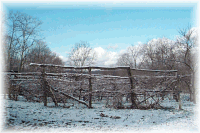 James, who dutifully entered the United States Navy during World War II, was one
of only three men who were killed when a submarine torpedoed their ship off the
Florida coast. Despite his great ability to absorb defeat, when the news reached
the twenty-eight year old Rose, he was devastated. James' death delivered an
unwelcome realization that his pipe dream sleigh ride through life was getting
him nowhere—no angels, no nirvana, no perfection. The mirror was showing
thinning hair and missing teeth. At that point, he came out of his corner,
punching at the clouds, casting off the husk of dogmatic disciplines, and
strangely enough...he collided with a brick wall. But this brick wall, unlike
the previous traumas, first rocked, and then came crashing down after a series
of personal conflicts. In a recorded lecture at Boston College, he recounted the
final experience at age thirty:
James, who dutifully entered the United States Navy during World War II, was one
of only three men who were killed when a submarine torpedoed their ship off the
Florida coast. Despite his great ability to absorb defeat, when the news reached
the twenty-eight year old Rose, he was devastated. James' death delivered an
unwelcome realization that his pipe dream sleigh ride through life was getting
him nowhere—no angels, no nirvana, no perfection. The mirror was showing
thinning hair and missing teeth. At that point, he came out of his corner,
punching at the clouds, casting off the husk of dogmatic disciplines, and
strangely enough...he collided with a brick wall. But this brick wall, unlike
the previous traumas, first rocked, and then came crashing down after a series
of personal conflicts. In a recorded lecture at Boston College, he recounted the
final experience at age thirty:
It occurred in Seattle, Washington—I was thirty years of age at the time and I had been fed-up several times with what I was doing. I had been into yoga and other things, and several times between the ages of twenty-eight and thirty I had given it up and wished I could go out, get drunk, and forget about it. In fact, I had gone to Seattle to get married and I was going to chuck the whole thing. I said, 'If I get married, I'll throw it out—forget about it.'
But while I was there I picked up a job, and again I gravitated down toward the library. I'm back down there reading books on yoga, and doing my yoga exercises—trying to marry the two, the mundane world, and this mental drive that I had. I think that this was the catalytic factor that caused the experience—trying to bring these two together. I could be wrong.
I had a room in an apartment hotel of sorts, and I would come home every day, sit up on the bed with my feet tucked up under me, meditate and think. So this particular day I sat there—and I started to get a pain in the top of my head, right in the center of the top. The pain got worse—in fact it got so bad that I started weeping.
Tears started to come out of my eyes. I couldn't stand it, and I thought, 'Oh boy, three thousand miles from home and I've got to blow my stack. That's what is happening.' I thought that I would have a stroke or possibly go crazy. Because I didn't think that it would just stop on its own.
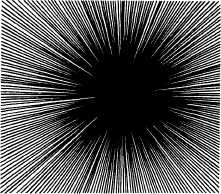
But I was aware at the peak of this pain of going out the hotel window. I was aware of actually seeing people who were on the street at the time, except that I was above them. This was in daylight, incidentally, it wasn't night. My window looked out toward the Cascade Range of snowcapped mountains. And I watched this just as if I were in an airplane, passing underneath me.
And then there was sort of a time flipover, in which I was no longer over the Cascade Range—now I could see all of humanity. I knew that all I had to do was look wherever I wanted, and I could see any man who ever lived or would live. There was no such thing as time. These people were all living now—all I had to do was to check them out, if I wished.
So I looked and I saw myself. I could see myself struggling down there—Richard Rose—I could see his whole life pattern. I'm still in a sort of astral projection form, I'm still much attached to the body, to these people, and I feel a tremendous amount of grief. A tremendous amount of sadness for this seemingly senseless struggle.
Then I realized that I was both humanity and my individual self, and that I was everything. And in an instant I realized that humanity didn't exist and that I didn't exist. But that I did exist in nothingness and everythingness, infinitely. And how long this lasted I had no way of checking, because I was alone and when I came back it was rather traumatic. And I stayed that way for several days, because it is as difficult to come back as it is to go into it.
If pressed, Rose reluctantly described his experience to inspire others into action, to let them know a golden objective may lay ahead; but reluctantly, because the happenings on that traumatic day do not make sense to the logic of the relative mind. Some time after the experience Rose attempted to convey his feelings, almost through automatic writing, which is documented in the "Three Books of the Absolute" (The Albigen Papers).
Following several attempts to personally communicate his findings to others, and having viewed the transparent robotic masses on the streets, Rose lost all hope at spreading the word during such a philosophically dry era in America. He recounted, "I came back to the earth with a bang," first marrying a childhood acquaintance and then raising three children. He operated a painting business and worked as a contractor for local jobs—all the while recording his thoughts in stacks of loosely organized notes and composing a number of poems regarding life's offerings. Through astute observation, he formulated personal opinions and collected facts on the nature of man and woman, on politics and "authority," on the fields of science, philosophy and psychology, and on the workings of nature. Though his neighbors knew very little of his experience, they would often consult Rose for everyday personal advice on how to deal with a vast array of problems. In fact, one acquires a sense of Rose's feelings about friendship—friendship with his fellowman and Truth—in his poetry book Carillon, in the poem titled "Friendship":
Friendship
by Richard Rose
I passed through a deep crevice at twilight,
And I saw a narrow vista of trees,
Magical in the mists —
Vocal to the hush of meaning,
Whispering to the wisdom of shades —
Of degrees —
Before the backdrop of eternity . . . .
And I had a friend . . .
Whose dust with mine was not the bond,
Whose love with mine was not the bond,
Whose teaching with me was not the bond.
Both of us had been to this same place,
To the twilight in the narrow crevice,
And because of this place, we are eternal.
Richard Rose went so far as to place a higher value on friendship than religion, because, he lamented, "Without friendship, religion would not exist." Rose told of the time he and another, through almost superhuman effort, lifted an overturned truck that had toppled onto a pregnant woman. He relinquished hundreds of acres of personal farm property for the sole purpose of providing others a place to discuss philosophic possibilities, all without asking any form of compensation—monetary or otherwise. But sometimes his warm-heartedness got him into trouble, like the time he rescued an abandoned, rain-soaked kitten, carrying it home under the protective cover of his jacket, but only to find later that it carried the mange. Though he was one of the more compassionate persons one might encounter in today's world, the word "compassion" did not adequately describe Rose, for a compassionate display is but a byproduct of the formula to a frontal assault on the untrue.
![]()
Rose's opportunity for which he had been searching a lifetime came in early 1972, when the Pittsburgh Theosophical Society asked him to speak about his interests in Zen. It was there that a long series of events were fired into action, initiating what would eventually develop into the TAT Foundation.
When hundreds of sincere seekers, as well as curiosity seekers, visited the TAT farm during the mid to late 1970's, Richard Rose and the group dynamics were truly changing lives. On the more basic level, many listeners were enthused about the prospects of clearing up their heads, dispelling discrepancies in their personalities and dogmatisms, and developing a skillful, disciplined mind. Some were healed of drug addictions and unhealthy lifestyles, and others later became successful business owners. But through it all, Rose sought most arduously to reach the minds of the more sincere seekers—those questing a maximum Enlightenment experience. The Albigen/TAT system entails no crash courses nor assembly-line production of Enlightened automatons. Rose provided a detailed road map, but he could not personally take just anyone "there." In subsequent years, several of Rose's students realized what he was pointing at with his teaching and, in turn, continue to help others in this grand adventure.
Over the next twenty years, Richard Rose took to lecturing at colleges and universities across the nation. These hard-hitting lectures were rooted in his personal findings and seriously challenged the mindset of his audiences. The subject material was diverse, at times questioning the paradigms of psychology, or the falsehoods of ritualistic dogma associated with so many cults and religions, both eastern and western. At other times, he directly confronted listeners with a series of far-reaching questions read from his book, Profound Writings: East and West, a "lecture of questions" designed to stir thoughts into action and propel one into self-discovery.
Rose took up arms against charlatans, as well as those that advocate immoral lifestyles. A number of lectures, at least in part, took on similar tones as this 1977 presentation:
Our society is becoming increasingly muddled, our morality is declining under the pretense that morality is only a subjective attitude, and in a wholesale acceptance of B.F. Skinner, we have decided to make morality a sacrifice which is necessary for the peace of the herd.
This modern approach is failing, because the wants of the individual cannot be guaranteed for that individual, until we know more about the nature of that individual. A man who pretends to know that which is best for humanity, or for the formation of a socio-psychological dynasty, and those groups that think they know what is best for humanity, and know how to force upon humanity (like we force castor-oil upon a constipated child)—the spiritual leechings of masturbation in order to make everyone placid, helpless and harmless—do not take enough into account.
They do not take into account the total nature of the individual, let alone That which drew the blueprint for humanity. They used to think that man was an evolutionary accident with an evolving blueprint after the fact. Now they think that man is making man."
Rose drew fire from some of his students for being overly harsh and critical, and one of inflexible, unyielding sternness. In his lectures, he was quick to silence any individuals who attempted to steal the podium for the purpose of perpetuating their personal propaganda, and accordingly would illicit strong emotional reactions from those with selfish intent. Most lecturers attempt to soften the brunt of their own ideas by cloaking critical facts behind vague "political correctness"; Rose, though, spoke of his discoveries with such candor and honesty that some confused his tones with arrogance, but most in the audience (or his readers) were struck by the sincere force of his message—a message meant to stir and awaken deeper thought. In fact, in the Zen-like tradition (though he does not embrace Zen), he employed a style of confrontation that shook all but the most steadfast sleepers.
And it must also be stressed that, despite numerous nationwide lectures as well as the publication of his seven books, Richard Rose was never a wealthy man, and lived among very humble surroundings near Moundsville, West Virginia. If altruism could be defined, it would be synonymous with the name Richard Rose.
Richard Rose—poet, author, lecturer, and teacher—was no ordinary individual in that he tempered strength with compassion, profound conviction with understanding. His unique style of laying out the welcome mat for sincere truth seekers, whether or not they agree with his ideas, was a rare set of circumstances in today's world—especially in the philosophical world of hucksters and insincerity. Rose's call to reevaluate our life situation and, if we so desire, to fight for the Truth, rings out to a sea of confusion among truth seekers, let alone the chaotic world masses. He minced no words, and violated all preconceptions as a "spiritual leader." He refused to combine stage-show tactics with his message. Still, he touched the minds of thousands of readers and listeners. In many ways, his thoughts and ideas can be compared with the great thinkers of the past century—Quimby, Maharshi, Krishnamurti, Hartmann, and Gurdjieff. And it is hoped future great thinkers like him will continue to carry a strong message of Truth.
![]()
Richard S. Rose, 88, formerly of Moundsville, WV, died Wednesday July 6, 2005, in the Weirton Geriatric Center. Visit the TAT Foundation Web site to read a biography and special obituary.
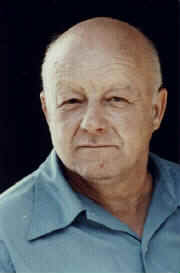
» Order books, audio and video products by and about Richard Rose from Rose Publications.
Read More About Richard Rose
After the Absolute: The Inner Teachings of Richard Rose by David Gold with Bart Marshall, including a Forward by Joseph Chilton Pearce.
Psychology of the Observer: The Path to Reality Through the Self by John Kent, a dissertation on the teachings of Richard Rose, presented in an organized, systematic manner.
Peace to the Wanderer: The Philosophy and Friendship of Richard Rose by Robert J. Martin. The story of what it was like before and after Richard Rose found the answer he longed for (PDF, 600 KB).
Once you have understood that you are nothing perceivable or conceivable, that whatever appears in the field of consciousness cannot be your self, you will apply yourself to the eradication of all self-identification, as the only way that can take you to a deeper realisation of your self. You literally progress by rejection—a veritable rocket.
- Sri Nisargadatta Maharaj, I Am That
© 2003-2024 SearchWithin.org All rights reserved.